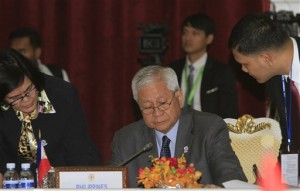MANILA, Philippines – Foreign Affairs Secretary Albert Del Rosario reiterated the country’s stance of a peaceful, rules-based approach in resolving the West Philippine Sea dispute, saying that this was the only legitimate and viable way of addressing the issue.
“The West Philippine Sea remains a focus of concern for the Philippines, for the region and for the international community and as we have maintained many times before, a rules-based approach is the only legitimate and viable way to address the issue,” Del Rosario said in a speech he made at the Philippine Conference held at Capitol Hilton in Washington D.C. Wednesday.
Del Rosario, Justice Secretary Leila de Lima, and Finance Secretary Cesar Purisima were the three cabinet officials invited by the Center for Strategic and International Studies and the US-Philippine Society to speak at the conference. Their speeches centered on the themes themes of Philippine foreign policy, governance of rule of law in the Philippines, and the Philippine Economy.
Del Rosario, in his speech, said that Manila maintained its three-track diplomatic, political, and legal approaches in addressing its territorial disputes.
China claims the entire West Philippine Sea, an atoll of reefs and island believed to be rich in gas resources, while the Philippines, Vietnam, Malaysia, Brunei and Taiwan all claim parts of it.
Del Rosario said that the Philippines would continue to avail of peaceful settlement mechanisms under the United Nations Convention on the Law of the Sea (Unclos), citing that the many interests in the region called for submitting maritime disputes to multilateral discussions in appropriate fora, in accordance with international law.
“We want to establish an actionable framework to define, clarify, and segregate, in accordance with the United Nations Convention on the Law of the Sea, the disputed and non-disputed areas of the West Philippine Sea,” he said.
“This would pave the way for feasible cooperation between the Association of Southeast Asian Nations (Asean) and China in the medium-term,” he added.
Del Rosario argued that the Philippines’ foreign policy approach was not aimed “isolating” one country, nor “forcing” the resolution of a dispute, but that its main goal was to contribute to ensuring that “global security and economic system was based firmly on the rule of law.”
“We are firmly committed to helping build an international system that will be just and fair to all states, regardless of economic size or power,” he said.
Del Rosario also underscored the importance of maintaining channels of discussions with China, saying that while the two countries were at a “very challenging period in our relations,” the West Philippine issue “does not constitute the sum total of our relations with China.”
“While we are working to strengthen other areas of the bilateral relations, we will not hesitate to speak out to protect our legitimate national interests,” he said.
He noted what he described as the Philippines’ long-standing historical and people to people ties with China, highlighting that the family of President Benigno Aquino III traces their roots to an ancestor from China’s Fujian province, and that China remained the Philippines’ third largest trading partner.
He said that the Philippines’ foreign policy approach had the full support of the United States, Australia, Japan, Korea, New Zealand and several member-countries of Asean and the European Union.
He noted that the Philippines welcomed the US pivot to Asia and that it was a “balancing factor in the region in promoting security and peace.”
“There is a wise saying that good fences make good neighbors. Drawing this to heart, the Philippines has been taking steps to build a minimum credible defense posture sufficient to defend the nation’s boundaries and sovereignty at sea. Our posture is and will remain entirely defensive in this regard,” he said.
